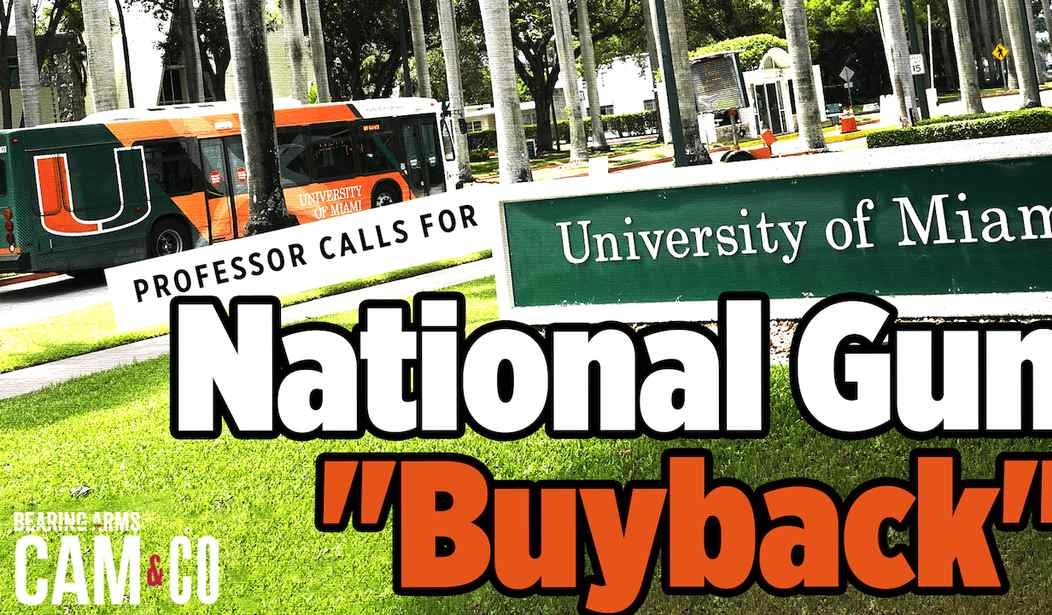Ever since the Bruen decision was handed down by the Supreme Court we’ve seen a flood of bad ideas coming from gun control supporters about how they can continue to interpose themselves between the American people and their right to keep and bear arms, and honestly, if I tried to write up a response to every idiotic suggestion I’ve run across I’d be working 24 hours a day 7 days a week. University of Miami political science professor Gregory Koger, however, has unleashed a proposal so audaciously unconstitutional and ineffective that I couldn’t resist taking it apart on today’s Bearing Arms’ Cam & Co.
Koger argues that there are three reasons why a regulatory approach to gun control that seeks to increase public safety by “banning private sales of some weapons, restricting who can buy specific weapons, controlling where guns can be carried or fired, and so on” isn’t effective: there aren’t the votes in Congress to pass “meaningful gun reform,” the Supreme Court’s skepticism about the constitutionality of many gun control laws, and the fact that “no politically feasible restrictive gun law would address the enormous number of firearms already in circulation.”
Koger’s answer? A national gun “buyback”, paid for by increasing the excise taxes on firearms, ammunition, and certain “tactical equipment.”
The federal government already levies about a 10 percent tax on firearms and ammunition. Under my proposal, these taxes would be increased significantly, though not so high as to be prohibitive and trigger court challenges. To go further, Congress could potentially apply a progressive tax based on how dangerous a weapon is, like placing a higher tax on an AR-15 semiautomatic rifle than a historic flintlock rifle.
Do gun buyback programs work? Critics point to cities that have purchased weapons and then destroyed them, typically on a short-term basis, with mixed results. However, other countries have national buyback programs that have had greater success. Several studies have confirmed that Australia’s buyback of assault weapons in the 1990s, albeit compulsory, reduced homicides and suicides. Additionally, the pricing structure will help provide the greatest benefit for public health by targeting the most violent weapons.
What are the “most violent weapons” in Koger’s book? Personally, I don’t know of any violent weapon at all, given that every gun I own is an inanimate object incapable of inflicting violence on its own, but my guess is he’s talking about AR-15s and AR-style rifles, given that he also spoke about taxing them at a higher rate than other firearm.
Regardless, Koger’s idea suffers from a couple of fatal flaws, including the fact that its intended to prevent law-abiding citizens from accessing their civil rights.
Additionally, increased taxes on firearms, ammunition, and gear could help reduce purchases of new guns. A 2002 study by Douglas C. Bice and David D. Hemley found that consumer demand in the handgun market is highly elastic: As prices increased by 1 percent, demand decreased by 2 to 3 percent. Congress can choose a tax rate that balances the need for revenue against discouraging private weapon sales.
Koger’s arguing out of both sides of his mouth here; on the one hand pointing out the “benefit” in jacking up taxes on guns and ammunition while at the same time cautioning that Congress shouldn’t raise taxes to the point that the punitive impact will be glaringly obvious. As long as it’s just those Americans struggling from paycheck to paycheck who are prevented from buying a gun for self-defense, apparently that’s cool with Koger.
I doubt the Supreme Court would feel the same way, especially given the Court’s decision in the 1943 case Murdock v. Pennsylvania, in which SCOTUS ruled that the state of Pennsylvania couldn’t impose a tax on the sale of religious merchandise and declared that states cannot impose a charge, tax, or fee for the enjoyment of a right protected by the Constitution.
Even if you want to set aside the constitutional concerns (as I’m sure Koger would prefer) there’s a more prosaic problem with his proposal; the numbers don’t add up. In 2021 the excise tax on firearms, ammunition, and archery equipment brought in a record-high $1.2-billion dollars in Pittman-Robertson funds. Let’s say Congress manages to double the 11% excise tax to 22% without drawing the ire of the Supreme Court, and now the federal government has a little more than a billion dollars per year to devote to Koger’s compensated confiscation schemes. At an average of $500 per gun, that amounts to a total of 2.4-million guns being “bought back” by Uncle Sam every 12 months.
Right now the firearms industry is selling about 1.2-million guns per month, which means that even if Koger’s “buyback” spent every penny it wouldn’t actually reduce the number of guns in private hands. Instead, it would only slow the rise in the number of privately-owned firearms by taking two months worth of gun sales out of circulation.
I’m sure that Gregory Koger is a smart guy, but he’s come up with a very dumb idea here. There’s no evidence that gun “buybacks” work to reduce violent crime, suicide, or accidental shootings in the first place, and using them as a way to raise the cost of gun ownership to the point that some Americans won’t be able to afford to exercise their Second Amendment rights is downright disturbing; not to mention deeply dubious from a legal standpoint. The fact that his “buyback” wouldn’t even reduce the number of guns in the hands of law-abiding Americans is just the cherry on top of this sundae of simplistic solutions.
Here’s a hint for Koger as he goes searching for his next big idea: in a country with 400-million privately owned guns, 100-million or so legal gun owners, and a framework of government that protects the right to both own and carry firearms for self-defense there is no way to meaningfully reduce the number of guns in circulation without running afoul of the Constitution and our individual rights. If Koger wants to reduce violent crime, he should be coming up with ways to ensure accountability for violent criminals. If, on the other hand, he’s intent on going after guns themselves, he’d be better off trying to repeal the Second Amendment outright. I don’t think he’ll have any success, but that would at least be a constitutionally sound approach for his gun-grabbing agenda.









Join the conversation as a VIP Member